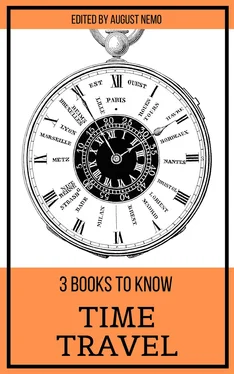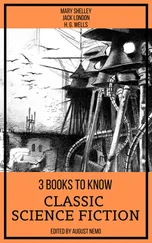1 ...8 9 10 12 13 14 ...28 “Going through the big palace, it seemed to me that the little people avoided me. It may have been my fancy, or it may have had something to do with my hammering at the gates of bronze. Yet I felt tolerably sure of the avoidance. I was careful, however, to show no concern and to abstain from any pursuit of them, and in the course of a day or two things got back to the old footing. I made what progress I could in the language, and in addition I pushed my explorations here and there. Either I missed some subtle point or their language was excessively simple—almost exclusively composed of concrete substantives and verbs. There seemed to be few, if any, abstract terms, or little use of figurative language. Their sentences were usually simple and of two words, and I failed to convey or understand any but the simplest propositions. I determined to put the thought of my Time Machine and the mystery of the bronze doors under the sphinx, as much as possible in a corner of memory, until my growing knowledge would lead me back to them in a natural way. Yet a certain feeling, you may understand, tethered me in a circle of a few miles round the point of my arrival.
––––––––
“SO FAR AS I COULD SEE, all the world displayed the same exuberant richness as the Thames valley. From every hill I climbed I saw the same abundance of splendid buildings, endlessly varied in material and style, the same clustering thickets of evergreens, the same blossom-laden trees and tree ferns. Here and there water shone like silver, and beyond, the land rose into blue undulating hills, and so faded into the serenity of the sky. A peculiar feature, which presently attracted my attention, was the presence of certain circular wells, several, as it seemed to me, of a very great depth. One lay by the path up the hill which I had followed during my first walk. Like the others, it was rimmed with bronze, curiously wrought, and protected by a little cupola from the rain. Sitting by the side of these wells, and peering down into the shafted darkness, I could see no gleam of water, nor could I start any reflection with a lighted match. But in all of them I heard a certain sound: a thud—thud—thud, like the beating of some big engine; and I discovered, from the flaring of my matches, that a steady current of air set down the shafts. Further, I threw a scrap of paper into the throat of one, and, instead of fluttering slowly down, it was at once sucked swiftly out of sight.
“After a time, too, I came to connect these wells with tall towers standing here and there upon the slopes; for above them there was often just such a flicker in the air as one sees on a hot day above a sun-scorched beach. Putting things together, I reached a strong suggestion of an extensive system of subterranean ventilation, whose true import it was difficult to imagine. I was at first inclined to associate it with the sanitary apparatus of these people. It was an obvious conclusion, but it was absolutely wrong.
“And here I must admit that I learnt very little of drains and bells and modes of conveyance, and the like conveniences, during my time in this real future. In some of these visions of Utopias and coming times which I have read, there is a vast amount of detail about building, and social arrangements, and so forth. But while such details are easy enough to obtain when the whole world is contained in one’s imagination, they are altogether inaccessible to a real traveller amid such realities as I found here. Conceive the tale of London which a negro, fresh from Central Africa, would take back to his tribe! What would he know of railway companies, of social movements, of telephone and telegraph wires, of the Parcels Delivery Company, and postal orders and the like? Yet we, at least, should be willing enough to explain these things to him! And even of what he knew, how much could he make his untravelled friend either apprehend or believe? Then, think how narrow the gap between a negro and a white man of our own times, and how wide the interval between myself and these of the Golden Age! I was sensible of much which was unseen, and which contributed to my comfort; but save for a general impression of automatic organisation, I fear I can convey very little of the difference to your mind.
“In the matter of sepulture, for instance, I could see no signs of crematoria nor anything suggestive of tombs. But it occurred to me that, possibly, there might be cemeteries (or crematoria) somewhere beyond the range of my explorings. This, again, was a question I deliberately put to myself, and my curiosity was at first entirely defeated upon the point. The thing puzzled me, and I was led to make a further remark, which puzzled me still more: that aged and infirm among this people there were none.
“I must confess that my satisfaction with my first theories of an automatic civilisation and a decadent humanity did not long endure. Yet I could think of no other. Let me put my difficulties. The several big palaces I had explored were mere living places, great dining-halls and sleeping apartments. I could find no machinery, no appliances of any kind. Yet these people were clothed in pleasant fabrics that must at times need renewal, and their sandals, though undecorated, were fairly complex specimens of metalwork. Somehow such things must be made. And the little people displayed no vestige of a creative tendency. There were no shops, no workshops, no sign of importations among them. They spent all their time in playing gently, in bathing in the river, in making love in a half-playful fashion, in eating fruit and sleeping. I could not see how things were kept going.
“Then, again, about the Time Machine: something, I knew not what, had taken it into the hollow pedestal of the White Sphinx. Why? For the life of me I could not imagine. Those waterless wells, too, those flickering pillars. I felt I lacked a clue. I felt—how shall I put it? Suppose you found an inscription, with sentences here and there in excellent plain English, and interpolated therewith, others made up of words, of letters even, absolutely unknown to you? Well, on the third day of my visit, that was how the world of Eight Hundred and Two Thousand Seven Hundred and One presented itself to me!
“That day, too, I made a friend—of a sort. It happened that, as I was watching some of the little people bathing in a shallow, one of them was seized with cramp and began drifting downstream. The main current ran rather swiftly, but not too strongly for even a moderate swimmer. It will give you an idea, therefore, of the strange deficiency in these creatures, when I tell you that none made the slightest attempt to rescue the weakly crying little thing which was drowning before their eyes. When I realised this, I hurriedly slipped off my clothes, and, wading in at a point lower down, I caught the poor mite and drew her safe to land. A little rubbing of the limbs soon brought her round, and I had the satisfaction of seeing she was all right before I left her. I had got to such a low estimate of her kind that I did not expect any gratitude from her. In that, however, I was wrong.
“This happened in the morning. In the afternoon I met my little woman, as I believe it was, as I was returning towards my centre from an exploration, and she received me with cries of delight and presented me with a big garland of flowers—evidently made for me and me alone. The thing took my imagination. Very possibly I had been feeling desolate. At any rate I did my best to display my appreciation of the gift. We were soon seated together in a little stone arbour, engaged in conversation, chiefly of smiles. The creature’s friendliness affected me exactly as a child’s might have done. We passed each other flowers, and she kissed my hands. I did the same to hers. Then I tried talk, and found that her name was Weena, which, though I don’t know what it meant, somehow seemed appropriate enough. That was the beginning of a queer friendship which lasted a week, and ended—as I will tell you!
Читать дальше












